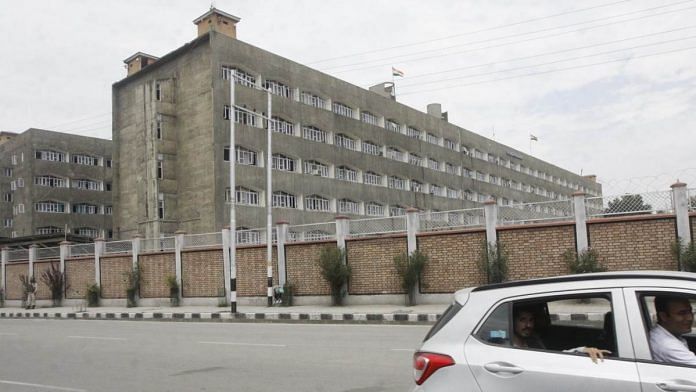New Delhi: Last month, the Lok Sabha passed the Jammu and Kashmir Reorganisation (Amendment) Bill, 2021, which merged the J&K cadre of All India Service Officers comprising Indian Administrative Service (IAS), Indian Police Service (IPS), and Indian Forest Service (IFS) officers with that of the Arunachal Pradesh, Goa, Mizoram, and Union Territory (AGMUT) cadre.
This implies that officers of these services, posted in Union Territories and the three states mentioned, can now also be posted in J&K and Ladakh, and vice versa.
Since J&K is a union territory now, this ordinance was a logical move. However, it is also expected to address a key problem that the erstwhile state has been battling for decades — an acute shortage of bureaucrats.
The former cadre had a stipulated strength of 137 IAS officers but there were only 58 serving officers. Of these, at least nine are on deputation to the central government.
This shortage, therefore, threw up challenges of governance — each officer is known to handle multiple portfolios in J&K — along with violation of rules.
According to the All India Service Rules, the position of the District Magistrate in any district is a cadre post, which means it cannot be filled by a person who is not an IAS officer.
However, according to data perused by ThePrint, given the shortage of IAS officers in J&K, officers from the Kashmir Administrative Service (KAS) have been manning posts reserved for the IAS, without being promoted to the IAS.
The data indicated that of the 20 DMs in the union territory, nine are officers of the Kashmir Administrative Service (KAS).
While the AIS rules have provisions for this, like shortage of officers from the IAS, according to Rule 9(2) of the IAS(Cadre) Rules, 1954, the “exceptions” are supposed to be short-term measures and require the state government to duly obtain prior approval of the central government.
However, last year, the central government had pulled up the Nagaland government for “illegally” posting state service officers to cadre posts of DMs.
In Kashmir though, officers note, the appointment of non-IAS and non-IPS officers to cadre posts of the IAS and the IPS has been routine.
ThePrint contacted the official spokesperson of the J&K government, Rohit Kansal, and Department of Personnel & Training spokesperson Shambhu Choudhary via text messages and calls for a comment but there was no response till the publishing of this report.
“Right now, there is an acute shortage of IAS officers, because of which the government resorts to appointing KAS officers at the DM level,” said a senior officer in the J&K Secretariat, who wished to remain unnamed. “The data is there for everyone to see.”
Also read: Delimitation Commission likely to get a year’s extension, J&K polls could be further delayed
Political peculiarities of Kashmir
Aside from a shortage of officers, officials ThePrint spoke to said that the political dispensation in Kashmir actively preferred to have officers of the KAS to man key posts since they were seen as “insiders” by the public at large.
They were believed to understand the nuances of the Kashmir administration and security situation better than IAS officers, who are not always Kashmiris.
“The stated reason for the practice is that there aren’t enough IAS officers in the state, but the actual reason has always been to have Kashmiri officers manning important posts,” said former IAS officer from the state, Wajahat Habibullah.
A serving officer agreed. “The desire among all the state governments historically has been to have as many ‘insiders’ in state cadres. In Kashmir, due to political and security conditions, this tendency was even greater, even though the promotion quota of KAS officers into the IAS in Kashmir was 50 per cent, while for the rest of the country, it is 33 per cent…Even then, the rules were flouted by appointing KAS officers to DM posts directly without promotions into the IAS.”
The officer also explained that the KAS officers are seen to be better performers in Kashmir given that they have an understanding of the land.
Moreover, in J&K, no officer of the KAS has been inducted into the IAS since 2012 due to ongoing seniority disputes and legal battles, thereby shrinking the pool of IAS officers even further.
While every state has a 37 per cent quota reserved for state service officers who are promoted to the IAS and IPS, in J&K, this quota had been 50 per cent until the revocation of Article 370.
Addressing the issue, Home Minister Amit Shah recently said in Parliament, “The ratio (of state service officers to AIS) is the same for the whole country. Why must it be different for Kashmir? Is Kashmir not part of the country?”
However, given that J&K’s crippling shortage of IAS officers has resulted in KAS officers manning IAS posts even without promotion, reducing their quota without increasing induction of IAS officers who serve in Kashmir could only add to the governance troubles in the state, one of the officers quoted above said.
Also read: India-Pakistan ceasefire pact won’t affect counter-terrorism operations in J&K, says Army




THE GOVT MUST FIX RESPONSIBILITY ON BUREACRATS IF THE WORK IS DELAYED SINCE THIS DELAY IS REASON OF RAMPANT CORRUPTION & INCREASE IN COST OF EXECUTION OF PROJECTS WHICH SHOULD BE RECOVERED FROM ERRING OFFICIALS. SIMILAR ACTION IS MUST AGAINST ILLITERATE & INCOMPETENT MINISTERS WHOSE PERFORMANCE IS DISMAL. THE GOVT MUST TAKE STERN ACTION RATHER THAN DILL DOLL TACTICS ADOPTED BY MODI GOVT NOW. THE WARNING THE CULPRITS WILL HAVE NO RESULTS WHICH IS FUTILE EXERCISE.